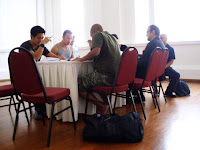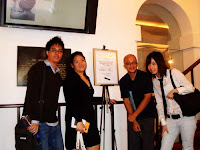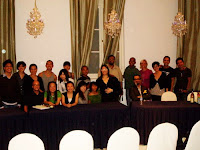Some answers to the questions posed during a recent e-mail interview with Epiphany, an arts publication from the Nanyang Technological University.
~
Let’s start off with an easy and obvious question: did your personal experiences in National Service (NS) serve as inspiration when writing the plays?
Yes. I think this is more evident in Radio Silence – I have gotten lost before while I was on a mission in which I had to navigate while in a vehicle. It was really embarrassing to admit to my driver that I didn’t know where the hell we were. Thankfully, I managed to find the way out, or else the plays would never have been written! However, I must state for the record that Radio Silence and Full Tank! are not fully autobiographical pieces; I’ve never rode in a tank before, and I’ve never had to go through jungle survival training. The style and tone of the absurd exchanges in both plays are culled from my own experiences with the bureaucracy and social rituals of the military, but most of the content of both pieces are made up of stories told to me by my friends. This is especially so in Radio Silence, but in Full Tank!, it’s actually an extrapolation of the question: what would happen if four soldiers hijacked a tank and drove it down Orchard Road?
Own Time Own Target is sure to resonate with many, if not all, male theatre-goers. But what do you think women will be able to take away from the plays?
The plays have a militaristic backdrop, but it doesn’t mean that the themes discussed in them are irrelevant to women. Having said that, perhaps I should elaborate a bit more about the themes of Radio Silence and Full Tank!
Specifically, Radio Silence deals with the issue of communication. I personally believe that even though humankind has made so much scientific and technological progress, especially in terms of communications technology, we still lag far behind in terms of basic human communication; we still don’t know how to speak to each other in terms that all of us can understand, because of all the layers of power, rules and rituals we have shrouded ourselves with.
For Full Tank!, the play deals with the issues of responsibility, governance and power, and asks the question: do the people in charge really know what’s going on, and what are the decisions they make based on, in terms of logic, coherence and relevance to the people they lead?
Nevertheless, the beauty of art is in its flexibility and dynamism, and each person must be allowed to make meaning of each piece of art for herself.
Give us one common misconception that the female gender has about NS:
I think the conception that women have misconceptions about NS is a misconception in itself.
Some detractors cite that Own Time Own Target is merely following in the footsteps of Army Daze, the iconic NS play which was staged in 1987, 1996 and most recently, 2006. Any comments on this statement?
In all truth, the only thing that OTOT shares with Army Daze is the military setting. Apart from that, we are very different, in terms of the themes we discuss and the stereotypes we aim to subvert. At the same time, I personally want to challenge this “iconic” status that Army Daze is perceived to have. I feel that there is a pressing need in Singapore to discuss topics relating to NS, and not enough playwrights to write about them.
Laremy, Radio Silence and Full Tank! are your first forays into professional theatre. How are you feeling about that?
I’m at a really good point in my life right now, and what with the plays being staged, it’s been a really exciting time for me. I’m definitely very thankful for having been given this opportunity to cut my teeth on something as big as the OCBC Singapore Theatre Festival. At the same time, I’ve been very humbled by the whole experience, because it has made me realize that a lot of my achievements would never have been possible without the support of my family, friends and mentors. If any of the people from these groups I have mentioned are reading this, I’d like to tell them: thank you very much. Your love has always been very much appreciated.
Finally, do you have any advice for aspiring playwrights who might not be currently pursuing an English degree?
I have quite a bit to say but I think I’ll condense it into three main points:
-
Don’t be afraid to do what you love. If you’re not pursuing an English degree because ‘your parents told you that you need the Business degree to fall back on’, or because ‘they have always wanted you to graduate as a Lawyer’, I’d say: screw that. Follow your dreams, and if your gut has been telling you to do Lit, I think it’s high time you start listening to your gut and go for it.
-
Don’t be afraid to double-dip. Many local writers weren’t English majors to begin with anyway – think Philip Jeyaretnam, Alfian Sa’at, Daren Shiau and Goh Poh Seng. If you’re doing the Engineering gig because it’s something you love, but you also love writing, then go for that too. What’s more, the experience you gain from discipline will definitely help you in the other, so long as you actively work to make the connections.
-
Don’t be afraid, period. Regardless of the field you have chosen to study, you’ve also chosen to write because you have something to say. The truth is that everyone has something to say, but not everyone knows how to say it. If you’ve been given that gift of letting your text speak for you, then keep on working on honing that gift by continuing to write. It’ll be your stage someday.
And finally,


